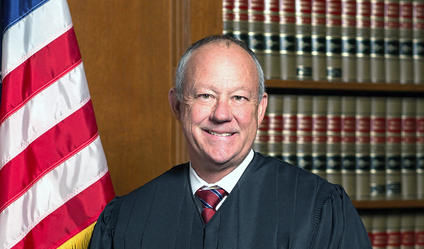COURT CRAWL | Taxpayer Bill of Rights emerges unscathed from lawsuit, update on Biden’s judge nominees

Welcome to Court Crawl, Colorado Politics’ roundup of news from the third branch of government. The Denver-based U.S. Court of Appeals for the 10th Circuit dismissed a decade-old lawsuit seeking to invalidate Colorado’s Taxpayer Bill of Rights and the U.S. Senate has gone on recess for the rest of the year without confirming one of the president’s judicial nominees for Colorado.
TABOR lives on
? In a major decision last week, the 10th Circuit issued a definitive answer to the claim that TABOR violates the mandate Congress issued to Colorado at statehood that it have a “republican” form of government. The answer was: I guess we’ll never know.
? TABOR is the 1992 constitutional amendment that places restrictions on government taxing and spending. In 2011, state lawmakers challenged TABOR’s legality, and they were later replaced as plaintiffs by a handful of local governments who argued TABOR took away the types of fiscal decisions that elected officials are required to make in a “republican” form of government.
? After a panel of the 10th Circuit sent the case back to the trial court last year to figure out what a republican form of government means, Gov. Jared Polis, who is defending TABOR in the case, asked for a rare all-judges panel, known as an en banc hearing, to review that decision. The case was argued earlier this year, and the 7-2 decision last week resulted in a dismissal of the case with an opportunity for the plaintiffs to refile their claims.
? However, the mechanics of the decision were quite chaotic: there were four separate opinions among the nine judges. While the majority opinion was bipartisan – in the sense that three appointees of Democratic presidents joined four Republican appointees – it’s hard not to see a partisan split lurking below the surface. For instance:
All four Republican appointees wanted to dismiss the case (calling it a waste) and bar any new filings: “One would think a case in its second decade would have more. After all, Colorado has been stuck in federal court under two governors, wasting litigation resources along the way.” -Chief Judge Timothy M. Tymkovich


On the other hand, the two dissenting judges, both Democratic appointees, wanted to leave the case alone and avoid deciding whether the local governments had a legitimate claim: “Yet the majority decides these issues for the district court. In doing so, the majority gives the Governor more than he asked for and leaves the plaintiffs with nothing – no live case, and no viable path towards refiling.” –Senior Judge Mary Beck Briscoe
? What happens next? There is no answer yet, but Tymkovich told the local governments that if they are unhappy with the 10th Circuit, they should take it to the U.S. Supreme Court.

Where does Colorado stand on federal judges?
? The U.S. Senate is on recess until January, but prior to leaving the Capitol they confirmed a slate of President Joe Biden’s judicial nominees, bringing the total number of federal judges confirmed in Biden’s first year to 40. Among the 40 are Regina M. Rodriguez, a judge on Colorado’s federal trial court, and Veronica S. Rossman, who holds one of the three Colorado-based seats on the 10th Circuit.
? Not confirmed last week, however, was Charlotte N. Sweeney, the workers’ rights attorney who would be the state’s first openly gay federal judge. She was nominated to succeed U.S. District Court Senior Judge R. Brooke Jackson, who entered semi-retirement this year. Readers may recall that earlier this month, the Senate’s judiciary committee deadlocked on Sweeney’s nomination, after no Republican members voted for her. The effect of the tie vote was to delay her progress by requiring an additional vote.
? As a result, Sweeney will need to be re-nominated in the 2022 session. The result is a bit curious, given the timeline for filling the vacancy:
March 2021: Jackson indicates he will step down as an active judge
May: U.S. Sens. Michael Bennet and John Hickenlooper send their recommended candidates to the White House
August: Biden nominates Sweeney
September: Jackson takes senior status, steps down
October: Sweeney appears before Judiciary Committee
December (nine months after vacancy announcement): Committee records a tie vote, nomination expires as session ends
? The extended time to fill this particular seat could have implications for the next impending vacancy. In August, U.S. District Court Judge Christine M. Arguello gave an unusual amount of notice for her own semi-retirement, making the announcement 11 months in advance. Bennet and Hickenlooper promptly sent their choices to the administration, but those 11 months have since dwindled to seven. It would be odd if the Senate could not confirm a judge with nearly a year’s notice. The Court Crawl will have to wait and see how 2022 plays out.

Activity at the state Supreme Court
? A defendant who dies while their appeal is pending not only has their conviction and criminal charges thrown out under a longstanding legal rule, but they no longer have to pay restitution to their victims, the Colorado Supreme Court decided.
? Eagle County and a Vail Resorts subsidiary don’t see eye to eye on the correct way to calculate the taxable value of a luxury hotel in Vail. So the state’s justices are going to determine who got it right.
? Denver reportedly went to great lengths to help a drug-addicted mother complete her treatment plan so she wouldn’t lose her parental rights. However, because the mother belongs to an American Indian tribe, and her children are also considered members, federal law steps in to guide how states provide services. The Supreme Court is considering whether Denver did what it should have for the mother.
? The Supreme Court will take up two cases that will determine whether a defendant has the right to keep their preferred public defender once one has been appointed, and will also examine a lawsuit implicating a Depression-era federal finance law.
Miscellaneous decisions
? Denver officers stopped and frisked a juvenile because he was jaywalking and wearing a hoodie in the summer. The Court of Appeals found that search to be unconstitutional.
? An Alamosa County caseworker reportedly falsified a mother’s confession that she fatally injured her son. The 10th Circuit ruled that the caseworker may be held liable for affecting the fairness of the mother’s child abuse trial.
? The Teller County sheriff tried to argue that taxpayers could not challenge his agreement to enforce federal immigration law because the jail was not funded through county tax dollars. The Court of Appeals was not convinced.
? A Jefferson County prosecutor told the jury that a defendant’s refusal to answer to sex abuse allegations indicated he was guilty. Generally, under the Fifth Amendment, prosecutors can’t link a defendant’s invocation of his right against self-incrimination to his guilt. The Court of Appeals didn’t go so far as to say that the man’s silence before his arrest implicated any constitutional rights, but agreed the comments were improper based on the rules of evidence.
See you next year!
? The Court Crawl will be on hiatus for the upcoming holidays and will return the first week of January 2022.













